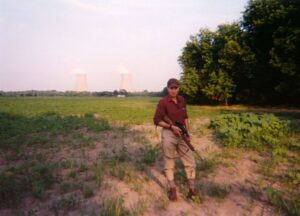Infantry Assault
The way he made that corpse dance
by emptying one magazine after another into it
and the way the corpse’s face began to peel off
like a mask because the skull had been shattered, brains
spilled out, but he couldn’t stop killing that corpse,
wanted to make damn sure, I thought maybe
he was killing all the one’s he’d missed, and
the way they dragged that guy out of the stream,
cut him to pieces, the stream running red
with all the bodies in it, and the way the captain
didn’t try to stop them, his silence saying, No Prisoners and
the way when all the Cong were dead, lined up in rows,
thirty-nine in all, our boys went to work on all the pigs
and chickens in the village until
there was no place that was not red, and
finally, how the thatch was lit, the village burned
and how afterwards we were quiet riding back
on the tracks, watching the ancestral serpent rise
over the village in black coils, and
how our bones knew what we’d done.
Night Ambush
We are still, lips swollen with mosquito bites.
A treeline opens out onto paddies
quartered by dikes, a moon in each,
and in the center, the hedged island of a village
floats in its own time, ribboned with smoke.
Someone is cooking fish.
Whispers move across water.
Children and old people. Anyone between
is a target. It is so quiet
you can hear a safety clicked off
all the way on the other side.
Things live in my hair. I do not bathe.
I have thrown away my underwear.
I have forgotten the why of everything.
I sense an indifference larger than anything
I know. All that will remain of us
is rusting metal disappearing in vines.
________________
Doug Anderson was a Navy Corpsman in a Marine rifle company in 1967. See more of Doug’s work on his website.

Two Poems by Doug Anderson
Infantry Assault
The way he made that corpse dance
by emptying one magazine after another into it
and the way the corpse’s face began to peel off
like a mask because the skull had been shattered, brains
spilled out, but he couldn’t stop killing that corpse,
wanted to make damn sure, I thought maybe
he was killing all the one’s he’d missed, and
the way they dragged that guy out of the stream,
cut him to pieces, the stream running red
with all the bodies in it, and the way the captain
didn’t try to stop them, his silence saying, No Prisoners and
the way when all the Cong were dead, lined up in rows,
thirty-nine in all, our boys went to work on all the pigs
and chickens in the village until
there was no place that was not red, and
finally, how the thatch was lit, the village burned
and how afterwards we were quiet riding back
on the tracks, watching the ancestral serpent rise
over the village in black coils, and
how our bones knew what we’d done.
Night Ambush
We are still, lips swollen with mosquito bites.
A treeline opens out onto paddies
quartered by dikes, a moon in each,
and in the center, the hedged island of a village
floats in its own time, ribboned with smoke.
Someone is cooking fish.
Whispers move across water.
Children and old people. Anyone between
is a target. It is so quiet
you can hear a safety clicked off
all the way on the other side.
Things live in my hair. I do not bathe.
I have thrown away my underwear.
I have forgotten the why of everything.
I sense an indifference larger than anything
I know. All that will remain of us
is rusting metal disappearing in vines.
________________
Doug Anderson was a Navy Corpsman in a Marine rifle company in 1967. See more of Doug’s work on his website.